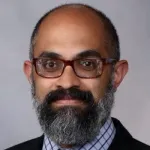
Dr. Karthik Balakrishnan studies ways to improve outcomes of pediatric airway reconstruction for diseases such as laryngotracheal, subglottic and tracheal stenosis, congenital tracheal stenosis and complete tracheal rings, laryngeal clefts, and vocal fold immobility and paralysis. He also examines the same questions for vascular malformations such as lymphatic malformations, venous malformations and hemangiomas.
Dr. Balakrishnan's research focuses on ways to standardize treatments and measure outcomes in these complex diseases, as well as ways to reduce treatment costs and medical errors, particularly those related to cognitive bias. By improving outcomes and reducing costs, he aims to improve the value of care, while also optimizing patient and caregiver experience during the care process.
Focus areas
- Standardizing outcomes and processes in pediatric airway reconstruction. Dr. Balakrishnan co-leads unique international and national multidisciplinary collaborative groups to develop standard processes and outcome measures for airway surgery and aerodigestive (breathing/voice/swallowing) care in children. His previous work has led to the development of similar standards for lymphatic malformations in the head and neck and for reconstructive surgery of the larynx (voice box) and trachea (windpipe) in children. He has internationally recognized expertise in developing consensus statements for these complex questions.
- Costs of otolaryngology care. Dr. Balakrishnan has studied thousands of patients and otolaryngology operations to identify factors that may predict more costly medical care. This will lead to process improvements that will allow Stanford and other institutions to reduce the cost burden that patients and the U.S. health care system face while maintaining quality and access to care. Dr. Balakrishnan's current work connects these costs to the outcomes and value of care provided.
- Cognitive bias and implicit bias and medical error. Dr. Balakrishnan is working to improve otolaryngology resident and provider education related to the effects of cognitive and implicit bias on medical decision-making, and ways to reduce medical errors related to those biases.
- Evidence-based care of vascular anomalies. Dr. Balakrishnan leads a task force of colleagues around the country to develop better scientific evidence to guide the care of challenging vascular anomalies such as lymphatic malformations.
- Innovative approaches to pediatric airway reconstruction. Dr. Balakrishnan has studied several minimally invasive endoscopic approaches to airway surgery and is currently developing new robotic techniques to reconstruct the airway.
Significance to patient care
Complex and rare conditions such as airway stenosis and vascular malformations greatly impact children's survival and quality of life, but treatment pathways and standardization of care are still lacking. Dr. Balakrishnan hopes that increasing standardization of care and outcome reporting for these conditions will help doctors provide better care for these patients, with reduced costs and a better experience for children and their families and caregivers. Meanwhile, by developing and studying new and potentially better ways to do airway surgery, Dr. Balakrishnan hopes to provide families with innovative options that may better suit their children's needs.
